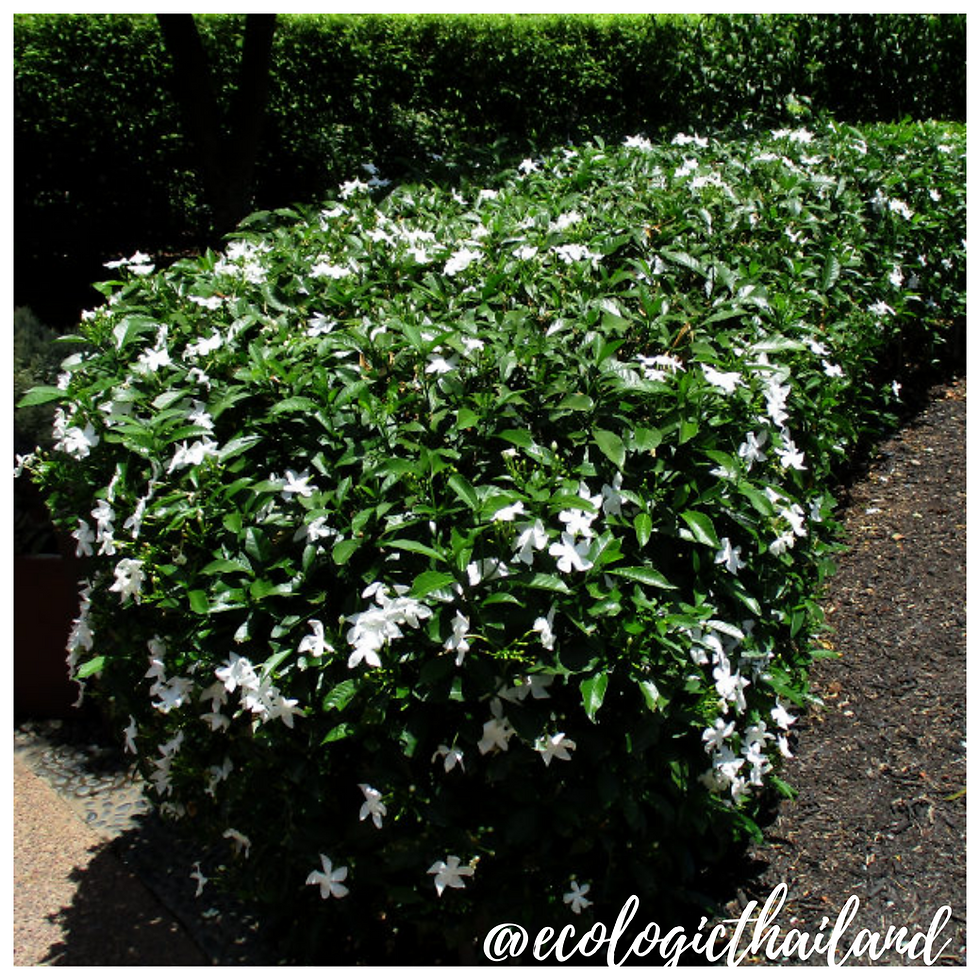Lemon Basil
- Eco-Logic Resort
- Sep 25, 2020
- 2 min read
Updated: Sep 30, 2020
Maenglak | แมงลัก) | Ocimum africanum
Family: Lamiaceae - Genus: Ocimum

Lemon Basil can be found everywhere on Mount Never-rest and in Paksong area.
Lemon basil is also know as , hoary basil, Thai lemon basil or Lao basil, The herb is grown primarily in northeastern Africa and southern Asia for its fragrant lemon scent, and is used in cooking. Lemon basil stems can grow to 20–40 centimeter tall. It has white flowers in late summer to early fall. The leaves are similar to basil leaves, but tend to be narrower with slightly serrated edges. Seeds form on the plant after flowering and dry on the plant.
It takes from 60 to 90 days after planting until the leaves and flowers of the lemon basil can be harvested. For harvesting, cut stems just before flowers open, strip leaves and use fresh, or dry on tray in dark, airy place. Leaves may be frozen.

LEMON BASIL PLANT
Lemon Basil herb plants are upright, bushy and grow to 20–40 centimeter tall. It has white flowers. The leaves are similar to basil leaves, but tend to be narrower with slightly serrated edges. Seeds form on the plant after flowering and dry on the plant.

LEMON BASIL LEAVES
The narrow, ovate, light green leaves reach 2 inches long. Leaves are edible and used in salads, vinegars and oils. Dried and fresh leaves can be used to make tea.

LEMON BASIL FLOWERS
Small blooms of white flowers are followed by lemon-scented seeds.
The flowers are edible and are delicious in fruit or green salads. Dried flowers can be used as seasoning or to make herbal teas.

LEMON BASIL SEEDS
Lemon basil seeds are used exclusively in desserts and drinks.
CULINARY USES OF LEMON BASIL
In Thailand, Lemon basil, called maenglak (Thai: แมงลัก), is one of several types of basil used in Thai cuisine. The leaves are used in certain Thai curries and it is also used in noodle soup dishes.
In Western cuisine the lemon basil makes a great pesto and can be used to top fish or shrimp. it adds a lovely flavor to vinegars and desserts.
The flowers are edible too and are delicious in fruit or green salads.
Dried flowers and leaves can be used as seasoning or to make herbal teas.
NUTRITION
Lemon basil has moderate levels of beta-carotene and high levels of vitamin K, which are renowned for their anti-inflammatory properties. It is a good source of manganese, copper and vitamin C, and contains calcium, folate, iron and magnesium, all of which are vital for proper body function. Basil is also a source of omega-3 fatty acids.
TRADITIONAL MEDICINAL USE OF LEMON BASIL
NOTE: please take advice from a doctor if you are planning to use herbal medicine.
Volatile oils present in Lemon basil, such as linalool, nerol and citral, have demonstrated antibacterial and antimicrobial properties.
Traditional uses include the treatment of snakebites, colds, and inflammation within nasal passages — a common effect of colds, for example.
INTO THE WILD: a down to earth experience

For guests and visitors to Paksong we organize weekly tours "The Edible Forest" and Foraging weekends: Into the Wild. We work with local guides to take you in the jungle of Paksong. After foraging, we will cook a meal with the ingredients, using bamboo together with you!
Come and join and learn about the abundance of food that nature gives us!
INTO THE WILD!


















Comments